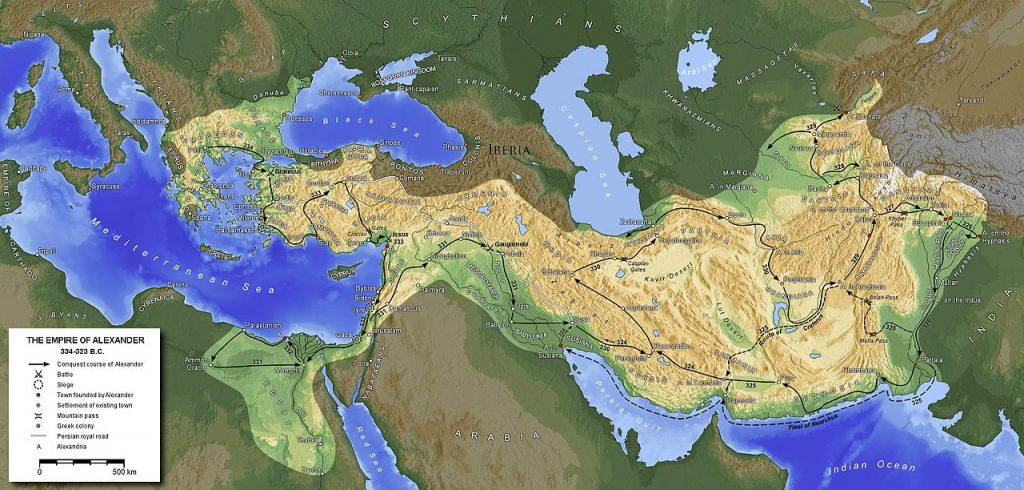In recorded history, countless individuals held the titles of king, and sought to rule and conquer to achieve greatness and prestige. The Kingdom of Macedonia produced two such individuals. These great kings demonstrated awesome military and diplomatic ability that allowed their actions to have profoundly impacted human civilization.1 One king is known to history as arguably one of the greatest conquers of the ancient world, Alexander the Great. The other king was his father, Philip II of Macedonia.2 The rule of Philip II saw the rise of Macedonia from a weak state unto a powerful and influential state that would come to dominate the Greek peninsula. Philip was able to transform his state by reorganizing the military and beginning successful military campaigns.3 A young Alexander had been groomed to one day take reigns Macedonia and he was able to take the legacy created by his father and built upon it. Alexanders military exploits ultimately immortalized himself in history as a legendary figure of great significance.

Philip II rose to the Macedonian throne in 359 BCE. He was twenty-four years of age. Due to the unstable and weak position of Macedonia in his youth, Philip lived as a political hostage in Thebes, where he would learn military strategy and different customs. As a child Philip demonstrated great ability to learn and understand, often said to have been a genius. At the beginning of his reign Macedonia was not a powerful state by any means. It was a divided nation between Upper Macedonia and Lower Macedonia that was governed by sets of powerful families with great influence.4 It possessed a relatively weak and poorly trained army, who mostly fought to survive against invading foreign powers. Macedonia was weak economically and institutionally, and surrounded by more powerful neighbors. It was bordered by the Illyrians to the north, Thrace to the east, and Epirus to the west who often preyed upon the weak nation through invasions and occupation.5
Philip II demonstrated great prowess in military, political, and diplomatic affairs. One of the first actions he took as King was to reorganize the military by increasing the size and therefore power of the Macedonian military, creating the famous Macedonian phalanx and a professional infantry core unit. Phillip demonstrated his diplomatic skill by using the act of marriage to secure numerous alliances, often taking foreign wives.6 Philip, through strategic planning and maneuvering, was able to use his new army to make Macedonia the hegemonic power in Greece through conquest. Upon Philip’s death, Macedonia had conquered Greece and set itself on a trajectory of conquest over much of Asia.7
Alexander was born in July 356 BCE, and was groomed to take the throne. It was said that Alexander was taught physical education by Leonidas and intellectually by Lysimachus of Acarnania, and by Aristotle. He was taught and given Aristotle’s edition of Homer’s works, which he kept as his most valuable possession. He grew to believe in Homeric notion of honor and glory as measurements of personal worth, trying to emulate his heroes Heracles and Achilles. The young Alexander proved to be a great student and demonstrated scholarly skill and interests. His studies came to an end at the age of sixteen, when he was named regent in his father’s absence. Alexander quickly began to showcase his talents as he was able end a revolt. His first military campaign being a success, his father eventually gave him command of the left flank of the Macedonian army, where Alexander continued to achieve military and diplomatic successes.8

Alexander ascended to the Macedonian throne upon the death of his father Philip, who was assassinated before he could launch his campaign to conquer Persia. The young Alexander was twenty-years old. Alexander took reins of his father’s work and set out to achieve success. He fulfilled Philip’s ambitious goal of conquering Asia Minor. In the autumn of 333, Alexander crushed King Darius III of Persia. Alexander had conquered the famed Persian Empire and expanded his empire. With the support of his loyal army, Alexander planned on conquering India, which was only ended by the refusal of his Macedonian troops to continue. Alexander the Great died in Babylon in 323 after falling ill at the age of thirty-three, having never lost a military battle. His legacy, however, continues to influence human history to present day. He is credited with spreading Hellenic culture throughout the areas he conquered.9
- Salem Press Biographical Encyclopedia, 2017, s.v., “Alexander the Great,” by Clark G. Reynolds. ↵
- Edmund M. Burke, “Philip II and Alexander the Great,” Military Affairs vol. 47, no. 2 (1988): 67-70. ↵
- Edward M. Anson, Alexander the Great: Themes and Issues (London: Bloomsbury Pub, 2013., 2013), 43-44. ↵
- Ian Worthington, Alexander the Great : Man and God (Routledge, 2014), 15. ↵
- G. T. Griffith, “The Macedonian Background,” Greece & Rome, vol. 12, no. 2 (1965): 125–26. ↵
- Edward M. Anson, Alexander the Great: Themes and Issues (London: Bloomsbury Pub, 2013), 54. ↵
- Ian Worthington, Alexander the Great : Man and God (Routledge, 2014), 25. ↵
- Ian Worthington, Alexander the Great : Man and God (Routledge, 2014), 36-37. ↵
- Salem Press Biographical Encyclopedia, 2017, s.v., “Alexander the Great,” by Clark G. Reynolds. ↵



42 comments
Samuel Vega
Alex, you did a good job summarizing the legacies of the two great Macedonian Kings. I am more familiar with Alexander the Great and knew that he began his rule in his 20s following the strategies that his father defined. I enjoyed learning more about Phillip II and how he reorganized the military once he became ruler which increased its size and power. You captured the essence of both father and son and described how both were powerful, smart, and strong leaders.
Daniel Matheu Baldor
People always talk about Alexander the Great but they never do it about what happened before. Philip II of Macedonia was a powerful king who achieved to turn Macedonia from a tiny power state to a powerful state, and then his son Alexander the Great turned it into the largest Empire ever known, and all of this in less than a century. Probably, two of the greatest strategists that Macedonia has ever had.
Carlos Serna
Wow! I knew about all the accomplishments of Alexander the Great. From leading his troops and taking the Persian empire. But I never knew that Philip II of Macedonia was his father, that explains everything. It is impressive how a son can be the exact replica of a father. It is a shame that Alexander died at a young age.
Raul Colunga
It is crazy to think about how father and son could make such a huge mark in history and change a disorganized state to an empire. Not only that but also how young they were when both of them had taken the throne and went on to be great leaders. Looking at the map it is impressive how much land was conquered and how powerful an army need to be to crush their enemies.
Samuel Vega
When I read this article and learned about the great kings of Macedonian I was impressed with the military and diplomatic skills of the kings. Philip II began building the Macedonian empire and after his death, his son Alexander the Great, continued to build the empire by conquering lands with his strong armies. It is incredible that his strategies laid the foundation for future armies. The author wrote a descriptive article on the time period which was very informative.
Vania Gonzalez
The Kingdom of Macedonia really did breed only conquering and successful kings or maybe it was just the bloodline. Both Alexander and Philip were great kings who left a legacy behind and prepared a lot for their conquests, their armies were at the time very advanced and they trained them to be the very best just Iike Alexander only learned and studied the best it was the same concept with their soldiers. This was a good article very well explained in their family history.
Olivia Murillo
The names of the Macedonian Kings have left a permanent mark on society, because of the militaristic and diplomatic strategies they used to conquer both the Greek and Persian Empire. This article highlights the achievements of Philip II, but more importantly the many incredible things Alexander accomplished in the name of the Macedonian people. He was a great leader, and his strategy is still being analyzed and studied to be applied to current tactics today.
Emmanuel Ewuzie
Untimely, early deaths of heroes, legends, and important figures are a travesty against history as it not only robs the world of their contributions but also of any future contributions. Alexander the Great was doing phenomenal things for Macedonia and was expanding the empire. Unfortunately, he fell ill and passed away leaving us to ponder what incredible feats he could have continues to accomplish.
Noah Wesolowski
The lands that alexander the great took over was a massive part of the known world at the time and a testament to how great of a leader and conqueror Alexander was at the time. But he is not the only part of why his army was so strong his father king Philip trained his army well and when he died Alexander inherited a battle hardened army capable of his plans.
Antonio Coffee
The kings of Macedonia were amazingly powerful figures. I never knew that Alexander was supposedly taught by Leonidas but it would make sense as to where he got his tactical genius, combined with the teachings of Aristotle. Out of the two kings, I have always found Alexander the more interesting but I recognize that without his father’s ability he would never have been able to get so far. I will always wonder how far Alexander would have been able to conquer if his army didn’t refuse to keep going.